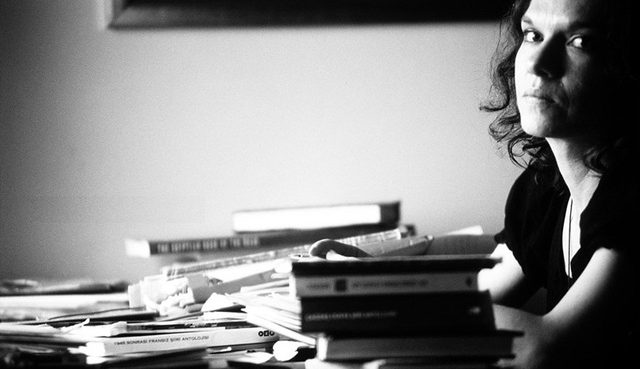Turkish Writer’s Story of Friendship, Impatience Behind Bars

Turkish writer Asli Erdogan has always gone where there is pain. As a young girl, she would shelter small animals under her coat in bad weather and feed them in her home. In her late 20s, she traveled through the slums of Brazil, collecting accounts of poverty, disease and hunger for a novel she was writing. And on the summer night last year when she was arrested in her home in Istanbul, police took — among other things — the flash drives that held stories based on letters political prisoners sent her more than 15 years before.
After her arrest, the roles quickly reversed: now the world was listening to Erdogan’s story as she wrote from inside her own prison cell. “I hope my voice reaches you through these thick, impenetrable walls,” she wrote in an October 2016 letter read to audiences at the Frankfurt Book Fair.
This was one of a number of letters the internationally known author sent from prison after her arrest in August. At the time, Erdogan was a columnist and member of the advisory board for Özgür Gündem, a pro-Kurdish newspaper she had worked for since 2011. The charges against her, “membership of a terrorist organization” and “undermining national unity,” are commonly used these days to jail reporters in Turkey, according to press advocacy groups.
Erdogan, 49, remained in prison until Dec. 29 when an Istanbul court ordered her release on the first day of her retrial. She is banned from leaving Turkey, however. While the international writing community celebrated Erdogan’s release as a win for press freedom, the media climate in Turkey has grown even darker since then.
“Turkey has never been a great paragon of press freedom and freedom of expression, but even in the recent past there was a vibrant media community,” said Nina Ognianova, Europe and Central Asia program coordinator for the Committee to Protect Journalists, a non-profit advocacy group, in an interview with Capital News Service. But after a failed coup attempt in July 2016, “the environment has gotten dramatically hostile for not only local media but also international media … this is unprecedented.”
The Turkish government set a record in 2016 for imprisoning the most journalists in one year, with 81 journalists currently in jail, according to CPJ. Since the attempted coup, during which the Turkish press reported more than 200 civilians were killed in clashes, President Recep Tayyip Erdogan, no relationship to the writer, has imposed a state of emergency and the government’s distrust in independent media has grown.
A spokesman for the Turkish Embassy in Washington declined to comment on Erdogan’s case. Embassy officials have said that journalists have not been arrested for their professional work, but for their illegal political activities.
In 2014, the year Erdogan’s Justice and Development Party (AKP) won the nation’s first democratic election, Turkish parliament amended the nation’s penal and criminal procedure codes, lowering the threshold of evidence needed to search people or places, from “strong suspicion” to “reasonable evidence” of wrong-doing, according to a 2015 Freedom House report.
“You don’t have to be a member of a terror organization, but prosecutors [will say] that you aid a terror organization,” said Uzay Bulut, a Turkish reporter for Voice of America, in an interview with Capital News Service. “… If you write about Kurdish rights, or if you write anything the government doesn’t like, they might label you as a terrorist. There are laws that enable the prosecutors to do that.”
A WRITER’S LIFE
Erdogan was pursuing a doctorate in Rio de Janeiro in 1994 when she quit physics to write and publish novels instead. The time Erdogan spent traveling through the Brazilian slums, or “favelas,” later inspired her breakthrough novel, “The City in Crimson Cloak,” which she published in 1998 after returning to Turkey. It has since been published in more than eight languages.
“She tried to explain all the tragedy of the human being … loneliness and tragedy, with [the metaphor of] the injured body,” said Sema Kaygusuz, a novelist and friend of Erdogan’s, in an interview with Capital News Service. “… She begins pessimist [sic], then she yells, she screams with compassion, for compassion.”
Erdogan’s career in journalism began the same year, with a column for the liberal Turkish newspaper, Radikal. She was fired from the paper twice for her controversial views on subjects such as prison, torture, and women’s and Kurdish rights, according to her website.
Erdogan has received numerous honors, including the Tucholsky Prize last year to recognize writers who fight for peace and press freedom. Between 1998-2000 she was the Turkish representative of International PEN’s Writers in Prison Committee. Just eight months before her arrest, she had returned from Krakow, Poland, where she had spent a year at the International Cities of Refuge Network’s residency for at-risk writers.
“[Her family] taught her to support … people who are suffering,” wrote her mother, Mine Aydoslu, in a letter to CNS while her daughter was in prison. “She has always been such a person all her life. That’s what she is currently paying for. ”
AN ARREST AT HOME
It was about 9 p.m. on Aug. 16 when armed police arrived at Erdogan’s apartment in Istanbul. She was working from home that day as she usually did. She knew that just hours before, the police had shuttered the Özgür Gündem office five kilometers away and arrested 20 of the newspaper’s employees, her lawyer, Erdal Dogan, told CNS. When they showed up and knocked on her door, she wasn’t surprised.
“They entered her apartment and they searched,” said Kaygusuz, her friend and fellow novelist. “… But she’s a writer, what can they find? She’s a writer. Only books and newspapers.”
After rifling through her library of more than 3,000 works of literature, history and fiction, the police took four books about the Kurds, a historically marginalized ethnic group in Turkey. Before taking Erdogan to the police station, they also took two flash drives that held the stories she was writing about political prisoners who survived a famous, violent prison protest in 2000.
Erdogan spent three days in the police station before authorities told her what she was charged with and gave her access to a lawyer. She was brought before a judge on Aug. 19, where a prosecutor presented four of her stories as evidence against her. All of the stories had been published between April and July 2016. Her imprisonment was based on charges that are not accurate, said Dogan.
For three months she waited for her first trial to begin. When it finally started on Nov. 23, the charge of “undermining national unity” had been dropped. She gathered her luggage when she heard the news, convinced that this would be the day of her release, Dogan said.
But later that night word reached her that there had been a miscommunication. Though the first charge was dropped, the charge of being an alleged member in a terrorist organization remained. Her next hearing was set for Dec. 29.
Erdogan was crushed, Dogan said.
TURKEY’S WAR AGAINST JOURNALISTS
Erdogan’s detention was just one small example of President Erdogan’s campaign to silence independent journalists and writers. Since the state of emergency, the government has shuttered more than 100 news outlets and detained, arrested or fired more than 150,000 Turkish citizens — including about 150 journalists — for suspected affiliation with FETÖ, the religious and social movement led by former Erdogan ally Fetullah Gülen. Turkey now designates FETÖ a terrorist organization and holds it responsible for the coup attempt.
“These emergency provisions have resulted in a number of abuses, removal of fair trial protections and safeguard against torture,” CPJ’s Ognianova said. “And it has resulted in the de facto cleansing of the media space of … voices alternative to the government’s voices.”
An official at the State Department said the United States and Turkey regularly communicate about the importance of free press and assembly, which are “key parts of any healthy democracy.”
“These actions against certain journalists appear to be part of a trend in Turkey whereby official bodies – law enforcement and judicial authorities – are being used to discourage views critical of the government,” a State Department official, who said they were not permitted to be quoted by name, wrote to CNS in response to questions about the case. “We urge Turkey to abide by its commitment to fundamental principles such as freedom of the press, freedom of assembly, due process, judicial independence.”
Though the United States and Turkey have been NATO allies for decades, their geopolitical relationship is complicated. Both nations are cooperative partners in the fight against ISIS, and Turkey’s Incirlik air base hosts a critical U.S. military presence in the Middle East, according to an August 2016 Congressional Research Service report.
But the July coup attempt has implications for Turkey-U.S. relations, as Gülen is a U.S. resident and has founded more than 100 American charter schools. Turkish officials have formally requested his extradition multiple times since the coup, and are concerned that the United States isn’t responding to their requests.
A Turkish embassy spokesman told CNS that Gülen’s U.S. charter schools might have helped fund the coup attempt.
LIFE BEHIND BARS
In Bakirköy Prison, Erdogan wrote in a letter to CNS before her release, the days were short and the nights long. The days repeated themselves: mornings began with head count, then breakfast. Quiet time, then meetings with lawyers, and then head count again. She said she tried to cope with the monotony by practicing yoga, solving puzzles, writing notes and reading, the letter said.
“But none of these stop the pain I feel in my heart,” she wrote.
If it were not for the camaraderie that she and the 20 other women in her ward formed, her situation would have been even more desolate, she wrote. But the women all looked out for each other.
Erdogan had arrived at Bakirköy with diabetes, pancreatic enzyme deficiency and spinal problems. Dogan, her lawyer, said he was able to get her the medication she needed for her pancreas after much deliberation, but was unsuccessful in satisfying her other medical needs.
Each of the four times she was allowed to go to the prison hospital due to her medical conditions, she was bound by the wrists and driven in the back of a prison van, Dogan said. Only once was she taken and actually examined by a doctor; the other three times she was sent back without treatment after hours of waiting. The prison doctor was reluctant to prescribe anything out of fear that he would be fired for being too kind to prisoners, Dogan said.
According to the Turkish embassy spokesperson, Erdogan received no ill treatment in prison.
“She looks very frail and she has serious health issues,” said Cecile Oumhani, a French writer and friend, told CNS in September, after visiting her inside. “But at the same time she has a very great inner strength, as the present situation indicates. She has always been very, very determined. She has always put her ideas before her own security, her own health issues.”
Many voices from the international community rallied in support of Erdogan after her August arrest. Almost 300 activists, academics, publishers and writers signed an international petition demanding her release and freedom for other imprisoned Turkish writers.
In mid-November, Canadian poet and novelist Margaret Atwood wrote Erdogan a letter to honor the Day of the Imprisoned Writer, which PEN International, an organization that promotes literature and free expression, started in 1981.
“Like you, I and many, many other writers believe that literature can inspire the longing for justice, can generate tolerance, and can expand human sympathy and understanding,” Atwood wrote.
Efforts to pressure the government to free Erdogan were also strong on the local level. After hearing about her arrest and that of 70-year-old translator Necmiye Alpay, who was arrested on the same day, well-known Turkish novelist Asli Perker and a group of 10 other women writers began organizing in their defense.
They called themselves “Asli’nin Arkadaslari,” or “Friends of Asli.” Because of the number of journalists who are detained or arrested on a weekly basis in Turkey, Perker said in an interview with CNS, it is important to remind people this is happening.
“We’re trying to remind people every day that these two women are in prison and they’re not guilty,” said Perker whose group protested for two hours twice a week. They’re authors, they’re people of literature, and we have to do something about it. That’s what we’re trying to do everyday.”
Campaign
About this Site
Pressuncuffed.org seeks to encourage and promote rigorous student reporting, scholarly research and debate on the role of, and obstacles to, independent journalism in the United States and abroad. Our website features reporting by University of Maryland students about press freedom in the United States and abroad. It also offers resources to instructors elsewhere who may want to teach classes or hold workshops on this theme. In the near future, this site will become a place for student work from around the country and abroad.
Dana Priest, two-time Pulitzer Prize winner at The Washington Post and Knight Chair in Public Affairs Journalism at the University of Maryland.


